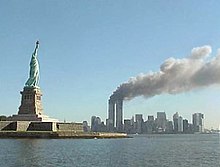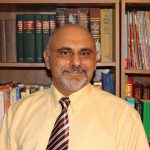The number one tragedy to have befallen the Middle East, as a result of 9/11, was the Iraq war.
Hesham Shehab: 18 Years after 9/11, the World Still Suffer Consequences

On this 18th anniversary of the Sept. 11 (9/11) attacks, we in the United States are rightfully focused on how that horrific tragedy changed our nation. It has affected all of us to some degree.
However, 9/11 was not just a tragedy, it was the beginning of a terrible chaos we are still suffering from in the Middle East.
The number one tragedy to have befallen the Middle East, as a result of 9/11, was the Iraq war. That war opened a can of worms in the region, and had unleashed so many of the grave problems plaguing the region today.
Unlike what former President George W. Bush administration wishfully hoped for, Saddam Hussein’s downfall did not lead to a domino effect of democracy, where other dictators fell, but it led to the rise of terrorist organizations and a quagmire of sectarian civil wars across the region.
The bloodshed in Syria, the terror of ISIS and a very dangerous increased Shia-Sunni split in the region are also what the Arab world has been forced to endure due to the Iraq War.
But the backlash of 9/11 for many Arabs extended beyond the war zones. The “war on terror” provided cover for dictators and enabled the Middle East authoritarian leaders to justify a lot of atrocities against their people. In places like Egypt, Syria, and Saudi Arabia, political opposition is stifled under the guise of fighting terror.
In addition, traveling to the United States has become very difficult in the years that followed 9/11. Many Arabs who wanted to study in U.S. colleges or come for tourism were denied visas.
I had that first-hand experience, as I travelled after 911 to the East coast from Lebanon, where I lived then. Even though I understood the necessity of the strict security measures that targeted Middle Eastern people like me, I still could not accept some of them, especially when I they ruined my flight schedule. The worst experience took place at the security check point of the U.S.- Canadian border as I was given a red bin to put my belongings, unlike like the others who were given blue bins. I felt like the lady in the famous, The Scarlet Letter, who had to embroider the letter “A” in red, as a mark of her alleged shameful adultery. The security procedures dragged and I knew that I was going to miss my flight, if they did not release me. I voiced that concern to the officer. I still remember his callous and curt reply: “I do not care.”
Alarmingly, yet unsurprisingly, recent polls find that people from certain “moderate” Arab countries such as Jordan (around 80 percent) and Lebanon (around 60 percent) hold negative views of the United States. Those numbers are worse than polling taken about a year after 9/11 where 53 percent of the people in several Arab countries held unfavorable opinions of America.
However, many in Arab world may hate American foreign policy, but they don’t hate the American people.
Yet, 18 years after 911, many Muslims are still in denial, and believe that the terrorist attacks were perpetrated by the CIA and the Jews. In addition, Hollywood, the CNN, and the Fox News, in that sense, are not at all helpful in portraying the real America we live in.
On this anniversary of 9/11, we grieve that this great nation is divided and acutely polarized between the Right and the Left, and is unable to deal with the enemies inside and outside. Because of that, the U.S. is unable to lead the free world properly. Hence, Americans need to make more friends than enemies, lead the world in human rights, speak softly, but carry a big stick.
Hesham Shehab
Read other columns from Hesham Shehab… https://xpian.news/2019/08/15/hesham-shehab-another-radical-palestinian-for-u-s-congress/

Hesham Shehab
Adjunct Faculty at College of DuPage, Formerly Adjunct Faculty at American University of Beirut and Pastor at Peace Lutheran Church Lombard, IL Name pronounciation: HI-shahm SHI-hab Hebrews 12: 4 & Philippians 1: 29




Comments are Closed